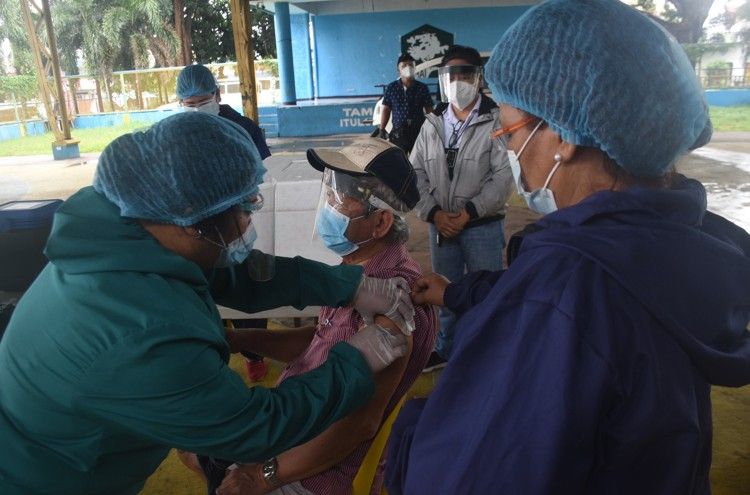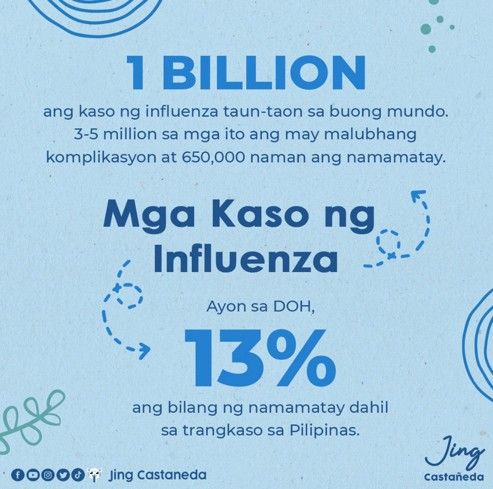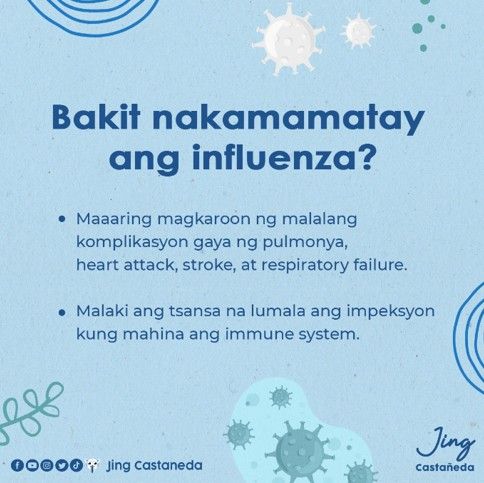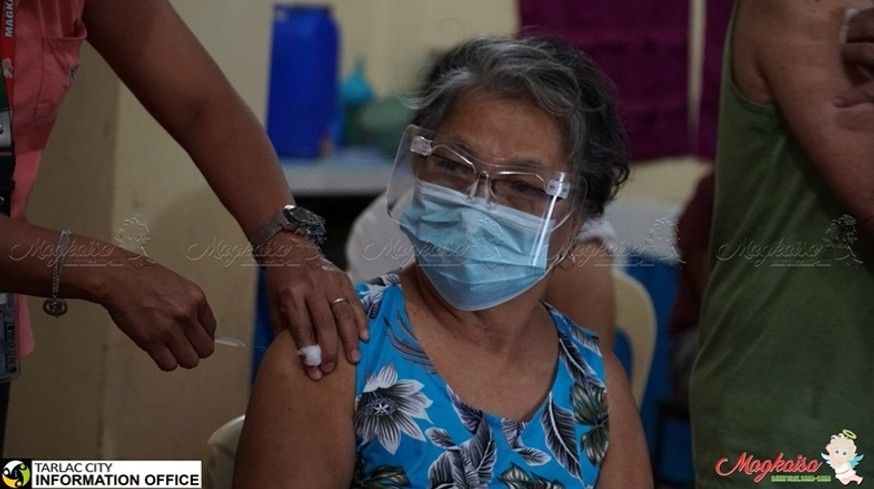Seniors’ safety: How harmful is the common flu?


It may be tempting to think of influenza, the common flu, as just a normal inconvenience. After all, almost all of us have endured several bouts of the flu through the years. And each time, we’ve managed to kick that bug after a few days of rest, right?
But is the flu as harmless as we’ve been led to believe?
That’s exactly what I wanted to find out in a recent episode of #PamilyaTalk entitled “Flu Fighter: Iligtas si Lolo’t Lola sa Flu.” Three special guests — pulmonologist Dr. Jennifer Ann Mendoza-Wi, Head, TB Assembly, Asian Pacific Society of Respirology; infectious disease expert Dr. Arthur Dessi Roman; and Mr. Jorge L. Banal Sr., known to us as Tito Jorge and current president of the Federation of Senior Citizen Association of the Philippines Inc.— joined me in this most informative discussion.
Caption: Senior citizens are encouraged to get flu vaccines every year. Studies show that they are among the most vulnerable to influenza, accounting for 70% of flu-related hospitalizations and 85% of flu-related deaths annually. (Photo: Muntinlupa City PIO)
Some alarming facts and figures
According to the World Health Organization (WHO), up to one billion (1B) people catch the flu annually. That’s more than 12% of the world’s total population. Of those 1B, anywhere from three million (3M) to five million (5M) people come down with a severe, life-threatening case of the flu.
But medical experts also call the flu a self-limiting disease, one that naturally runs its course and resolves itself over time. So everyone who comes down with it will eventually get 100% better, right? Unfortunately, the answer is no. Influenza kills up to 650,000 people each year.
Clearly, this illness is as deceptive as it is deadly.
Additionally, senior citizens are among the most vulnerable to influenza, accounting for 70% of flu-related hospitalizations and 85% of flu-related deaths annually. Why? According to Dr. Remedios Coronel, past president of the Philippine Society for Microbiology and Infectious Diseases, it’s because of an inevitable consequence of aging called immunosenescence. This is a naturally-occurring process that makes our immune system degrade and become less efficient over time.


Thus, the more we age, the more immunocompromised we become.
Complications: That which does not kill us…
Some may argue that 650,000 deaths amount to just 0.065% of the population. That’s such a negligible percentage compared to the 99.935% that do survive.
But the loved ones of each of those fatalities would surely beg to differ. Besides, even if the flu is considered self-limiting, Dr. Wi said that it doesn’t mean that all those who recover from it are completely out of the proverbial woods.
Because contrary to Nietzche’s famous adage, when it comes to the flu, that which does not kill us won’t necessarily make us stronger. Rather, it may lead to long-term complications that can significantly decrease the quality of life and can even prove to be lethal.
According to Dr. Wi, flu complications increase the risk of a heart attack by up to 10 times. They also increase the risk of pneumonia by up to eight times. Other possible complications include asthma, chronic lung disease, and even stroke, all of which can be fatal for all ages, but most especially to the elderly.

More bad news: My, my, my, my Flurona
With COVID-19 infections back on the rise, it’s possible to catch the flu and the coronavirus at the same time. Both Dr. Wi and Dr. Roman emphasized that this co-infection, dubbed Flurona, puts the sick person at higher risk for the deadly complications of both the flu and the coronavirus.
The US Centers for Disease Control and Prevention (CDC) says the Flurona is now a worldwide concern, with incidences reported in the United States, Israel, Hungary, Brazil, and—brace yourself, dear reader—--even the Philippines. This co-infection may potentially lead to pneumonia, acute respiratory distress syndrome, heart attack, heart or brain inflammation, stroke, organ failure and death.

Finally, some good news
The common flu, COVID-19, and Flurona are all preventable. Since the flu and Flurona are transmitted in pretty much the same way as COVID-19, Dr. Roman stressed the need to abide by the recommended minimum public health standards that we’re now accustomed to. This means continuing to mask up properly, observe social distancing, and practice good hand hygiene.
But the most crucial step is to get vaccinated. For COVID-19, this entails the recommended first two doses and subsequent booster shots. For influenza, this means getting your flu shot every year.
For more information on how the flu vaccine works to protect our dear Lolos and Lolas, please watch our Okay Doc special episode on vaccination on Pamilya Talk.
Still iffy about vaccines? Here are some FAQs you should consider.
Q: Is the flu shot safe?
A: Yes! Health experts cannot stress this enough: Vaccines are designed to give you and your family protection against preventable yet potentially fatal diseases. Consequently, when you’re protected from such diseases, then you’re also protected from the complications that may arise from them.
Q: Who should get vaccinated?
A: Everyone six months old or older, including those with comorbidities. See? The flu shot is THAT safe and effective, even for babies and the elderly.
Q: When’s the best time to get vaccinated against the flu?
A: In the Philippines, ideally between February and June, before the start of the rainy season. But if you missed these months, it’s never too late to get vaccinated at any other time. It’s never too late to make sure you and your loved ones are protected.
Q: Why is it necessary to get vaccinated against the flu every year?
A: To keep your protection at optimal and updated levels. This is because the protection offered by the vaccine declines over time. Flu viruses also keep changing, thus the shots need to be updated accordingly, often depending on the strains that are more dominant in the upcoming flu season.
Q: Where can I get vaccinated?
A: Ask your local health center or family physician. According to Tito Jorge, senior citizens are entitled to FREE flu shots, among other vaccines, courtesy of the Department of Health (DOH) and their local government unit (LGU) by virtue of the Expanded Senior Citizens Act of 2010.
Remember:
There’s absolutely no truth that vaccines are harmful to the body. They’re carefully engineered to provide you and your family protection against preventable yet potentially fatal diseases as well as the complications that come with them.
Vaccines aren't just safe, they're life-saving, especially for the elderly.
--
Watch Pamilya Talk on Facebook, YouTube and Kumu (@JingCastaneda – 12:00 noon – 1:00 p.m. Monday & Wednesday). You can also follow my social media accounts: Instagram, Facebook, YouTube, Tiktok, Twitter and Kumu. Please share your stories or suggest topics at editorial@jingcastaneda.ph



















